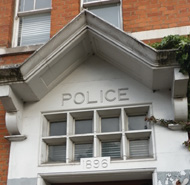Some police forces are artificially suppressing demand, by ‘down grading’ emergency calls to justify a slower response, failing to respond to vulnerable victims, and not formally classifying gangs of violent and dangerous criminals. So says Her Majesty’s Inspectorate of Constabulary (HMIC) in reports into police effectiveness.
According to the report, ‘In this time of rapid change in policing, HMIC is concerned that some of the fundamental actions and activities that police officers should be doing to reduce crime and keep people safe are simply not being carried out to the requisite standard. We found evidence of fewer arrests, too often wanted suspects not being pursued and apprehended, and, in some forces, a large number of crimes in effect written off’.
The police service is not as well equipped to stop crime happening in the first place as it has been, the inspectors warn. To read the national overall report, and reports by force area, visit the HMIC website.
HMI Zoë Billingham, who led the inspection, said: “Over the last few years, HMIC has said consistently that police forces were managing well in increasingly difficult circumstances. Nonetheless, today, I’m raising a red flag to warn forces of the consequences of what is, to all intents and purposes, an unconscious form of rationing of police services. Many forces deserve praise for taking steps to improve how they respond to vulnerable people. But this, whilst commendable, cannot be at the expense of other important areas of policing.
“During this inspection, we’ve seen how some forces are attempting to reduce pressure on their teams by artificially suppressing or downgrading calls upon their service, reducing their ability to take the most effective and prompt action. We think this is often an unintended consequence of recent changes forces have made, frequently in response to the challenge of austerity, and as they struggle to respond to increasing and ever changing levels of demand.
“Consequently, some basic things are not being done: we found evidence of fewer arrests being made, some crimes are being shelved without proper investigations taking place and suspects are not always being relentlessly tracked down. It is vital that police leaders take action now before these problems become more widespread and acute – so that the public are properly protected.”
Two of the 43 police forces are outstanding at crime prevention and four are outstanding in the way they tackle serious and organised crime. Only one force, Durham, was found to be ‘outstanding’ overall, with 28 forces being judged as ‘good’. One force was found to be ‘inadequate’ overall: Bedfordshire.
Bedfordshire Police’s Chief Constable Jon Boutcher responded that he felt his force had been unfairly judged.
The report found that police capabilities that are needed now, and will continue to be needed, such as skilled investigators and neighbourhood policing, are insufficient or being eroded. HMIC is warning of a national crisis in the shortage of detectives and investigators in many forces. This is often leading to excessive workloads and stress, say the inspectorate.
Organised crime
HMIC is concerned that there is no coherent national picture of threat posed to communities by organised crime groups [OCGs]. As the report puts it, the ‘police service does not have a coherent national picture of the threat posed to communities by organised crime and does not provide a reliable platform for prioritising activity aimed at disrupting and dismantling it’. As for what OCGs actually look like,the report suggests they are evovling; and can be ‘large, international or online networks, whose membership and offending patterns change rapidly and continually’.
HMIC has concerns that in too many cases forces are taking insufficient action to actively track down wanted suspects once their details have been circulated on the PNC (police national computer). The inspectors found ‘considerable variation between forces in the length of time that elapses before details of suspects are placed on the PNC’.
Comment
At the NPCC (National Police Chiefs’ Council), Lead for Crime Operations, Durham Chief Constable Michael Barton said: “HMIC’s inspection of police force effectiveness has found that most forces are good overall, more are improving particularly in protecting vulnerable people and victim satisfaction is at 83 per cent.
“It is our job to prevent crime and keep people safe so it is disappointing that HMIC also have concerns that some forces are falling short.
“Over the last five years, police budgets were reduced by 22 per cent and we lost 32,334 officers and staff at a time where the crime is changing, becoming more costly and complex to investigate and other calls for our service have increased. It’s a simple reality that we are required to prioritise more. Difficult decisions are being made between resourcing neighbourhood teams, response units, specialist investigations, and digital and cyber-enabled crime. Police chiefs around the country will be looking at their local assessment to consider the impact of resourcing decisions, which may have been hidden from view.
“There are no easy answers, we have to find long-term solutions so that we consistently prevent harm and manage the demand forces are facing. Chief officers are working with Police & Crime Commissioners to deliver transformative change across policing that will make us better at fighting crime and protecting people in a cost effective way.
“We have submitted a Transformation Fund bid to create a taskforce that works with forces to learn from both good practice and where things have gone wrong to ensure we provide the best service to the public.”









